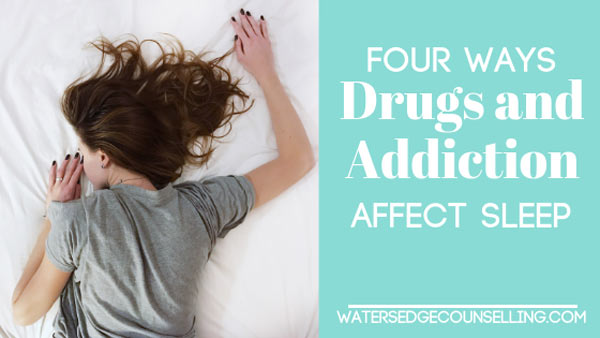
This post is a condensed version of the article, ‘How Addiction Affects Sleep’ by The Sleep Help Institute. Read the full, original article here.
The quality of your sleep is affected by everything. From your habits and the food you eat, to the medications you take and drinks you ingest. So, it’s no surprise that if a person has developed an addiction—to an over-the-counter drug, alcohol, or other type of substance—that addiction could affect their sleep quality, too.
Sleep disorders and addiction have a bidirectional relationship: Each individual issue—alcohol dependence, insomnia, etc.—relate to and effect the other issue. The nature of this intricate relationship requires a person seek treatment for both issues to find a healthy, sustainable resolution.
How do various substance addictions upset the body’s brain chemistry and disrupt the natural sleep rhythm? The answers vary. Each substance type has different characteristics, and affects an addicted person’s sleep in various ways.
Stimulants
Cocaine effects the brain’s limbic system. The system consists of interconnected regions that regulate motivation and pleasure. Cocaine’s short-term effects immediately cause a buildup of dopamine, which can cause euphoria. This euphoria can make a person want to take the drug again.
Because cocaine increases wakefulness, it can disrupt REM sleep. And cocaine withdrawal can lead to disturbed sleep and unpleasant dreams (also known as a parasomnia).
Amphetamines stimulate the central nervous system. Although amphetamines are used to treat multiple medical issues, such as depression and attention deficit hyperactivity disorder (ADHD), people can develop a psychological amphetamine dependence.
Use of amphetamines can decrease the amount of time a person spends in REM sleep periods.
Hallucinogens
Hallucinogens are a group of drugs that can alter a person’s perception, and cause sensations or create images that aren’t real. A few examples of hallucinations are as follows:
- Ayahuasca
- DMT
- D-lysergic acid diethylamide (LSD)
- Peyote (Mescaline)
- 4-phosphoryloxy-N,N-dimethyltryptamine (psilocybin)
In general, hallucinogens can interfere with serotonin. Serotonin regulates sleep and other major bodily functions. When a person takes a hallucinogen, they can experience short-term sleep problems. A study in the journal Therapeutic Advances in Psychopharmacology also states LSD users often experience a loss of sleep.
Sleep loss, which sometimes presents as insomnia, can either be chronic (difficulty falling or staying asleep at least three nights a week for three months or more) or short-term (lasts less tan three months, or presents when a person has trouble falling or staying asleep).
MDMA, also known as 3,4-methylenedioxymethamphetamine or ecstasy, is a specific type hallucinogen and stimulant. It’s a synthetic drug. MDMA can make a person feel energized, and distort their perceptions and how they experience time.
People who use a lot of MDMA can experience persistent sleep disturbances. MDMA also can affect the human body’s monoamine neurotransmitters. These neurotransmitters greatly affect sleep and daytime alertness (also known as hypersomnia).
Depressants
Marijuana dependence is similar to other substance abuse disorders. People who have issues with this substance face social, psychological, and physical impairments. Dependent users also have sleep problems.
A study that appeared in the journal Sleep Medicine Reviews reports that people who smoke marijuana have a hard time falling asleep, and have strange dreams when they experience marijuana withdrawal.
Another study in the journal Addiction Science & Clinical Practice found that chronic cannabis use can negatively affect sleep during withdrawal. Insomnia, sleep withdrawal, and strange dreams were reported.
People often assume alcohol can help them sleep because it causes drowsiness. Although alcohol can help a person fall asleep, it causes disrupted sleep. Disturbances can occur during sleep stage transitions. These disturbances can worsen the effects of insomnia and cause sleep apnea.
The previously mentioned study in the journal Addiction Science & Clinical Practice also reports that alcohol users can experience:
- A hard time falling asleep
- Awakening during the night
- Daytime sleepiness
- Abnormal sleep quality
Also, insomnia is the most prevalent complaint from alcoholics after they quit drinking.
Opioids
Opioid drugs come in illegal and legal forms. Heroin, for example, is illegal, and other opioids, such as the synthetic drug fentanyl, and pain relievers, such as oxycodone, hydrocodone, codeine, and morphine, are available via prescription.
Opioids are a well-known sleep disrupter. A study in the journal Anesthesiology explains that opioids can block the human body’s access to rapid eye movement (REM) sleep. These drugs also can block access to the deeper, restorative stages of non-REM sleep. A lack of sleep can actually make any pain a person may feel—for example, the pain they are taking opioids for—worse.
When a person ceases using opioids, they can experience sleep issues. An article in the journal Psychiatry Research examined the quality of sleep in people who had “heroin use disorder” who were going through “early methadone maintenance therapy” (MMT). The study participants experienced less sleep and daytime sleepiness.
Another study in the journal Drug Alcohol Dependence also found that people in the early stages of methadone detox had issues getting enough sleep. Their sleep quality was poor, too.
Do you have a loved on struggling with addiction? Are you looking for healthy ways to calm yourself and sleep? Here’s what you need to do: Contact Colleen on 0434 337 245 or Duncan on 0434 331 243 for a FREE 10 minute consultation on how we can best help you or book online.
Leave a Reply